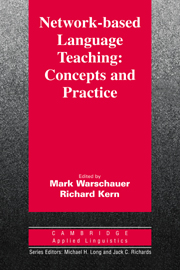Book contents
- Frontmatter
- Contents
- List of contributors
- Series editors' preface
- Preface
- 1 Introduction: Theory and practice of network-based language teaching
- 2 Sociocollaborative language learning in Bulgaria
- 3 On-line learning in second language classrooms: An ethnographic study
- 4 Negotiation in cyberspace: The role of chatting in the development of grammatical competence
- 5 Writing into change: Style shifting in asynchronous electronic discourse
- 6 Computers and collaborative writing in the foreign language curriculum
- 7 Networked multimedia environments for second language acquisition
- 8 An electronic literacy approach to network-based language teaching
- 9 Task-based language learning via audiovisual networks: The LEVERAGE project
- 10 Is networked-based learning CALL?
- Name index
- Subject index
5 - Writing into change: Style shifting in asynchronous electronic discourse
Published online by Cambridge University Press: 05 October 2012
- Frontmatter
- Contents
- List of contributors
- Series editors' preface
- Preface
- 1 Introduction: Theory and practice of network-based language teaching
- 2 Sociocollaborative language learning in Bulgaria
- 3 On-line learning in second language classrooms: An ethnographic study
- 4 Negotiation in cyberspace: The role of chatting in the development of grammatical competence
- 5 Writing into change: Style shifting in asynchronous electronic discourse
- 6 Computers and collaborative writing in the foreign language curriculum
- 7 Networked multimedia environments for second language acquisition
- 8 An electronic literacy approach to network-based language teaching
- 9 Task-based language learning via audiovisual networks: The LEVERAGE project
- 10 Is networked-based learning CALL?
- Name index
- Subject index
Summary
Asynchronous electronic discourse presents researchers with a way to look at how writers accommodate to each other in a medium that is new to them. Even when the asynchronous exchange is relatively brief, as in monthlong asynchronous computer conferences, one can spot some aspects of style shifting in extemporaneously composed on-line replies to other writers' postings. Style shifting in response to each other's texts takes place in the writings of both L1 and L2 writers and, like conversation, is keyed to the preferences of the individual. For L2 writers, newly plummeted into an L1 environment, such style shifting can be a signal that they have become aware of a range of discourse conventions in the L1 and are beginning to imitate or accommodate to these conventions. That is what student writers told us in their reflections on participating in a pair of asynchronous conferences, and it is what we think their writing substantiates.
This study examines what happens to different features of discourse when EFL learners must move to function in an ESL situation, as shown by changes in their writing in asynchronous, or delayed-time, mainframe conferences. Specifically, we examine style-shifting patterns in rapidly keyboarded writings by three newly arrived Chinese and Japanese graduate students as they participated with thirty-one other graduate and advanced undergraduate students from Asia, the United States and Canada, France, Egypt, and the United Arab Emirates (UAE) in a sequenced pair of asynchronous mainframe conferences.
- Type
- Chapter
- Information
- Network-Based Language Teaching: Concepts and PracticeConcepts and Practice, pp. 87 - 120Publisher: Cambridge University PressPrint publication year: 2000
- 14
- Cited by



